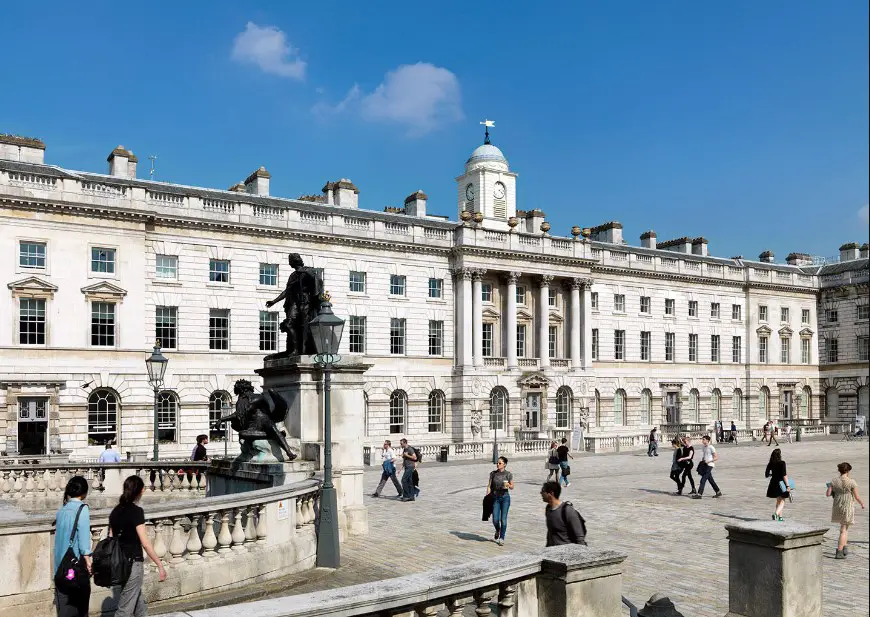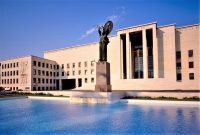King’s College London was founded almost 200 years ago. While it has undergone an extensive evolution during its existence, it has consistently remained one of the world’s most prestigious colleges for university-level study – a reputation that is well-earned.
Students who achieve a place at King’s are guaranteed a high-quality education from some of the leading experts in their chosen field. The college also provides access to cutting-edge facilities, whether it be medical training labs, contemporary studio spaces or dedicated subject libraries packed with every resource needed to succeed.

Table of Contents
Overview
About this university
Based in the heart of London, King’s College is a key part of the city. Students will be able to enjoy the benefits of attending a college that offers partnerships and affiliations with many major organizations, most of which are based close by in the capital. It also gives students the chance to enjoy a huge array of leisure, recreation and dining during their downtime, while transport links are of course excellent.
International students are made very welcome at King’s, a college that already has a diverse student body. There are specialist support teams to help with the application process and visas, along with supplementary foundation and pre-sessional English courses for students who need additional support. Students from all over the world can attend King’s and enjoy a world-class education that, with hard work, will lead to a highly fulfilling career.
The support network at King’s is outstanding, for all students. They will be able to get help with anything which could impede their studies, whether that is mental or physical health concerns, finance issues or career guidance.
University ranking
| Academic Ranking of World Universities | QS World University Rankings | Times Higher Education World University Rankings |
| 2022 | 2021 | 2020 | 2024 | 2023 | 2022 | 2023 | 2022 | 2021 |
| 48 | 47 | 47 | 40 | 37 | 35 | 35 | 35 | 35 |
| -1 | -3 | -2 |
What’s new
Nothing stands still at King’s College London – while the college may have existed for almost 200 years, it has never stagnated and there is always something new and exciting happening to take it to the next level. This includes investment in new facilities, success stories of graduates, and research developments that enhance global society.
Recent examples include the development of a new type of MRI scanner, led by research carried out at the college. This new scanner was developed in partnership with Siemens Healthineers and will allow for further research into various medical conditions outside of a hospital setting.
Meanwhile, the King’s Entrepreneurship Institute has recently been awarded an NUS Green Impact Gold Award for its work in sustainability, demonstrating how the college continues to evolve and minimise its environmental impact.
The recent Commonwealth Games held in the UK featured numerous alumni and current students from King’s College London, who also made use of the sporting facilities offered by the college during their studies. Notable examples include Dina Asher-Smith and Imani-Lara Lansiquot for Great Britain, and Bryan Leong for Malaysia.
Students who wish to get involved in leading research, study at an environmentally responsible college or combine studies with sporting greatness should consider King’s College London.
Finances
How much will it cost?
| Average tuition fees per year | Living costs |
| £28,750 | £27,840 | £7,000 | £8,320 |
| Undergraduate | Postgraduate | Living costs | To live on campus |
Scholarships & funding
Students attending King’s College London must pay annual tuition fees, and while these are currently set at GBP 9,250 for UK students at undergraduate level, they can vary for international students depending on the course. These fees may also increase every year.
International students are also asked to pay a deposit to secure their place at the college, currently set at GBP 2,000 for students on most programmes, or GBP 5,000 for medical and dental programmes. This deposit is then offset against tuition fees when students join the college.
Many students are sponsored to attend King’s, but there are also various scholarships and bursaries available to help cover tuition fees and other costs. Eligibility varies depending on the subject in question and students are advised to read through the available options, to see what they may be able to apply for.
Eligibility
Entry requirements
Competition for places at King’s College London is high, and students applying will need to ensure they meet the minimum eligibility criteria for their chosen course, which will vary by each area of study.
Even if students meet the criteria success is not guaranteed, with preference given to students who exceed the requirements or that can demonstrate their potential to the college through their application.
All students, UK and international, must use UCAS for their application, with students set a deadline of 26th January to apply for a September intake (or a 15th October deadline the year prior for medical and dentistry programmes).
Courses at King’s are all taught in English, so international students must be able to demonstrate their command of the language through recognized qualifications. Requirements for minimum scores on standard tests may vary depending on the subject.
Department and Faculty
Teaching quality
Students who are successful in their application to King’s College will benefit from one of the finest educations in the world. KCL justifies its exemplary reputation, with teaching faculty sought from the top levels of success in every field.
Many of the courses are ranked highly by independent league tables, both in the UK and globally, with some of the schools remaining at the top of their field for many years.
The facilities provided are also of the highest standard – students won’t just learn in lecture theatres and study rooms, but will have access to cutting-edge laboratories and studios equipped with the latest resources being used in the working environment.
Plus, King’s has established links with some of the largest businesses and organisations in the UK and around the world. Students will benefit from shared experiences and resources, and have a potential entry point for their future career as well.
Department structure
There are nine different faculties that make up King’s College London:
Faculty of Arts and Humanities
Offering a wide range of modern subjects, including classics, digital humanities, history, music, philosophy and others.
King’s Business School
One of the largest management institutions in London, this school attracts students from over 80 countries as it develops the next generation of business leaders.
Faculty of Dentistry, Oral & Craniofacial Sciences
Considered one of the world’s leading centres for excellent in its respective areas, this faculty offers a world-class education and trains dentists at all levels.
The Dickson Poon School of Law
One of the oldest law schools in the country, and one of the best in the world, this faculty consists of a highly diverse student body that are addressing many of the great legal challenges in the world.
Faculty of Life Sciences & Medicine
A highly successful research and education school, students can choose from a range of health-related undergraduate courses covering population sciences, pharmacy, microbial sciences and more.
Faculty of Natural, Mathematical & Engineering Sciences
A school with a long-standing tradition of excellence, students can study the major sciences here along with engineering and mathematical degrees.
Florence Nightingale Faculty of Nursing, Midwifery & Palliative Care
A descendent of the 1860 Nightingale Training School, this faculty helps to train the next generation of nurses across multiple disciplines, demonstrating how to give patients the best care possible.
Institute of Psychiatry, Psychology & Neuroscience
With three major schools broken down into various speciality departments, this faculty is a true leader in courses surrounding a range of neurological studies.
Faculty of Social Science & Public Policy
Students attending this faculty can learn amongst a truly global community, whether they are studying global politics, education or any other of the excellent courses offered here.
Campus and facilities
Facilities
Students attending KCL will find that its reputation is well-earned. Not only will students enjoy the highest standards of teaching, but they will benefit from outstanding facilities too – both for learning and for the other aspects of student life.
The college has multiple libraries situated in close proximity, with each one having a dedicated collection to a particular area of study. Students are not restricted to their own library though, and can use any library to access resources or find a quiet place to study.
Students can use a wide range of sport and wellness facilities owned by the college, including three separate gyms and two sports grounds, which are home to the college’s sports clubs. Whether students want to sign up for a team or just keep fit, they won’t be short of options.
Meanwhile the college’s students’ union has a range of facilities aimed at helping students feel welcome at the college, including advice services and venues for events. These range from career fairs to themed nights out.


